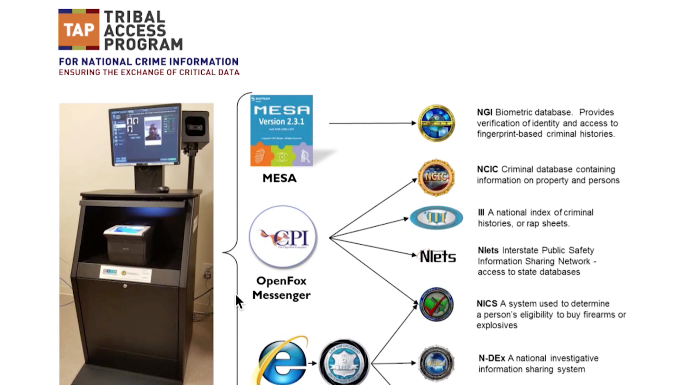Targeting crime and other civil matters could become a lot easier for a handful of Native American tribes.
Source: Justice Department expands program to combat crime on tribal lands
(WASHINGTON, D.C.) The Federal Government is expanding a program that allows American Indian Tribes to access national criminal databases.

The Metlakatla of Alaska are one of about ten tribes that will soon gain access to this resource.
“We have some of highest crime rates in Alaska, in the villages,” said Michelle Demmert, a citizen of the Tlingit and Haida Tribes of Alaska.
Demmert is applauding a recent move by the Justice Department to expand the Tribal Access Program. It allows native tribes to enter and search for records in the National Crime Information Database.
“These databases are vitally important to law enforcement to fulfill their jobs and obligations to the community. We have the same responsibilities to protect our citizens and provide a safe environment.”
Demmert now lives in Washington State and is a reservation attorney for the Tulalip Tribes. The Justice Department chose the tribe to participate in the initial phase of the program. Demmert says it’s making a major difference for law enforcement there.
“If we wanted to enter any of our records, That process was incredibly cumbersome,” Demmert explained. “Now, with the tribal access program, we are able to enter our own protection orders and criminal no contact orders.”
At this point, it’s unclear how this program will play out in a state like Alaska. The Last Frontier does not have reservations outside of the Metlakatla — a very isolated community.
“We have over half the tribes in the country in Alaska, but we don’t have tribal land, and so it’s difficult for me to suggest how this might work in Alaska, if it even works at all,” said Sen. Lisa Murkowski (R‑AK).
Sen. Murkowski points out the program is limited to areas with reservation status.
“So is it, a good and a positive thing to be doing more sharing of information through criminal databases so that we can provide for better protection for our American Indians, Alaska natives, absolutely,” Murkowski said. ” I think the question will be how does that play out in a state like Alaska.”
Phase two of the program will give 10 additional Native American tribes access to the database.

